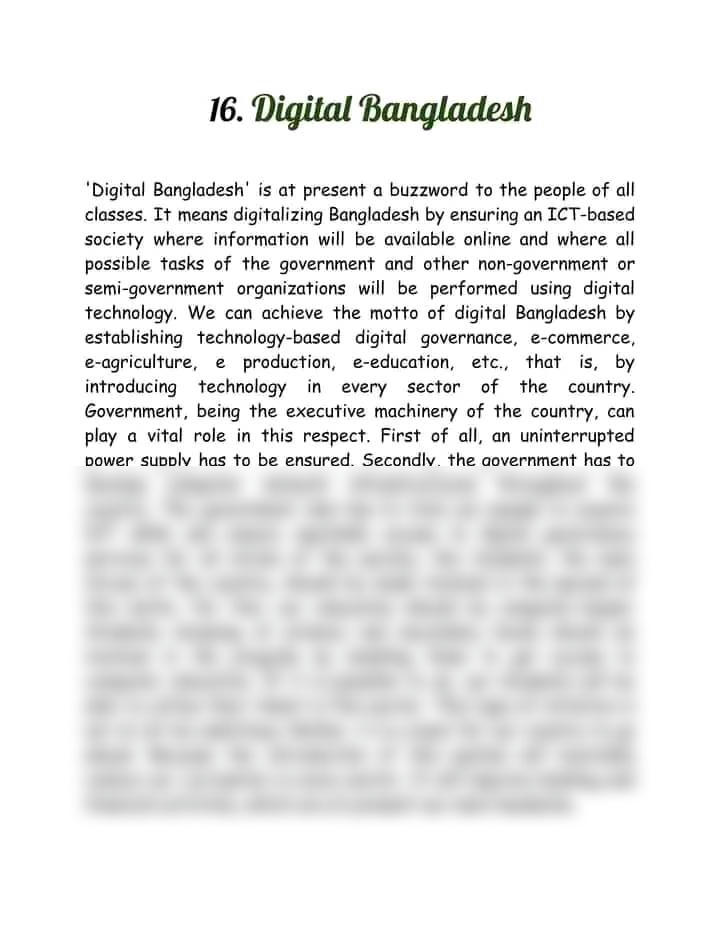Digital Bangladesh is a vision to transform the nation through technology integration and innovation. It aims to leverage digital tools for economic growth and social development, making services more accessible to all.
Bangladesh has made significant progress in implementing digital solutions in various sectors, such as education, healthcare, agriculture, and governance. This transformation is paving the way for a more connected and efficient society, bridging digital divides and empowering citizens. The government’s initiatives, private sector partnerships, and digital literacy programs are key components of realizing the Digital Bangladesh vision.
With technology driving progress and inclusivity, Bangladesh is on the path to becoming a modern and digitally advanced nation.
The Vision Of Digital Bangladesh
The vision of Digital Bangladesh is focused on the composition and implementation of cutting-edge digital technology to transform the nation into a technologically advanced society. With a goal to ensure access to information and services for all citizens, Digital Bangladesh aims to enhance communication, e-governance, and economic growth through digital means.
The Vision of Digital Bangladesh is a forward-thinking initiative that aims to transform the nation through the power of technology. In this digital age, Bangladesh is striving to harness the potential of digital technologies to drive economic growth, enhance governance, and improve the quality of life for its citizens.History And Evolution
The concept of Digital Bangladesh was first introduced by the Honorable Prime Minister Sheikh Hasina in 2008. Since then, the country has made significant strides in leveraging technology to create a more inclusive and efficient society.Government Initiatives
The government has spearheaded various initiatives to realize the vision of Digital Bangladesh. This includes expanding internet connectivity to rural areas, digitizing government services, promoting e-commerce, and investing in digital education.Ict Development In Bangladesh
Bangladesh is making impressive advancements in ICT development, shaping a digital revolution. This composition explores the strides the country has taken towards establishing a Digital Bangladesh, embracing technological innovations and improving access to digital services for its citizens.
Growth Of Internet Infrastructure
Bangladesh has witnessed a remarkable
Mobile Technology Advancements
The advancement of mobile
Digital Transformation In Various Sectors
In today’s technological era, Bangladesh is experiencing a rapid digital transformation across various sectors, leading to enhanced efficiency, accessibility, and innovation. The integration of digital technology has significantly revolutionized the way businesses, services, and societal functions operate, bringing about numerous benefits and improvements. Let’s delve into the impact of this digital revolution in key sectors of Bangladesh.
Education Sector
The education sector in Bangladesh has undergone a remarkable digital transformation, with the integration of technology aiming to improve the quality of education and learning experiences. E-learning platforms have facilitated remote learning and access to a vast range of educational resources, bridging geographical barriers and expanding educational opportunities for students. Interactive digital classrooms have enhanced the engagement and effectiveness of teaching methods, enabling a more interactive and personalized learning environment for students.
Healthcare Sector
The healthcare sector in Bangladesh has seen a significant digital transformation, leading to advancements in healthcare services and patient care. The adoption of Electronic Health Records (EHR) has streamlined patient information management, ensuring efficient and accurate healthcare delivery. Telemedicine services have expanded access to healthcare in remote areas, providing medical consultation and support through digital channels, thereby addressing the healthcare needs of a wider population.
Agricultural Sector
Within the agricultural sector, digital transformation has revolutionized farming practices and agricultural management. The utilization of agricultural mobile applications has provided farmers with essential information on crop management, pest control, and market prices, empowering them to make informed decisions and optimize their agricultural productivity. Precision agriculture techniques have been implemented, incorporating sensors and data analytics to enhance crop yield and resource efficiency, thereby contributing to sustainable agricultural development.

Credit: m.youtube.com
Digital Financial Inclusion
Digital Bangladesh is not just a concept, but a rapidly evolving reality that is transforming the country’s landscape. One of the key aspects of this transformation is digital financial inclusion, which aims to provide access to financial services to all segments of society. With the advent of technology, traditional barriers such as physical distance and high costs are being overcome, making financial services accessible to even the most remote areas.
Mobile Banking
Mobile banking has emerged as a game-changer in promoting financial inclusion in Bangladesh. With the widespread availability of mobile phones, millions of people now have access to banking services at their fingertips. Long gone are the days of standing in long queues or traveling long distances to access a bank branch. Through mobile banking, individuals can now open accounts, transfer money, pay bills, and even access credit facilities, all from the comfort of their own homes.
E-commerce Growth
The growth of e-commerce in Bangladesh has also played a significant role in promoting digital financial inclusion. As more and more businesses go online, consumers now have access to a wide range of products and services that were previously out of reach. With secure payment gateways and convenient delivery options, e-commerce platforms have made it easy for individuals to shop online and make digital payments. This has not only expanded consumer choices but has also provided opportunities for small businesses to thrive in the digital economy.
The impact of digital financial inclusion goes beyond convenience and accessibility. It has the potential to empower individuals and uplift communities. By having access to financial services, people can save money, access credit for business ventures, and protect themselves from economic shocks. Additionally, the digitization of financial services promotes transparency and accountability, reducing the risk of corruption and promoting a fairer economic system.
Challenges And Opportunities
As Bangladesh strives towards becoming a digital nation, it encounters various challenges and opportunities. These challenges, such as access and connectivity issues, need to be addressed to ensure that the benefits and opportunities of a digitally advanced society can be fully realized. On the other hand, there are also numerous opportunities that arise from the digital revolution, particularly in terms of skills development and economic growth.
Access And Connectivity Challenges
Ensuring widespread access to the digital infrastructure is crucial for the growth and development of a digital Bangladesh. However, the country faces a number of challenges in this regard:
- Inadequate internet penetration: A significant portion of the population still lacks access to the internet, hindering their ability to participate in the digital economy.
- Unequal distribution of connectivity: Rural areas often suffer from limited or poor internet connectivity, resulting in a digital divide between urban and rural populations.
- Infrastructure limitations: Limited availability of reliable and high-speed internet connections in some areas poses a barrier to the accessibility of digital services.
To overcome these challenges, the government has taken initiatives to expand internet coverage and improve the digital infrastructure across the country. This includes the implementation of the National Broadband Policy and the establishment of high-speed internet connectivity in rural areas.
Skills Development Opportunities
The digital revolution brings with it a plethora of opportunities for skills development, which can have far-reaching impacts on individuals and the nation’s economic growth:
- Enhanced educational opportunities: Digital technologies enable access to online learning platforms, remote education, and skill-sharing communities, providing individuals with opportunities to enhance their knowledge and acquire new skills.
- Growth of the IT sector: The digital transformation has created a high demand for IT professionals and skilled workers. This opens up avenues for employment and entrepreneurship in the IT industry.
- E-commerce and digital entrepreneurship: The rise of e-commerce platforms provides opportunities for entrepreneurs to start and expand online businesses, contributing to economic growth and job creation.
To harness these opportunities, it is essential to focus on digital literacy programs, vocational training, and capacity building initiatives. By equipping individuals with the necessary skills, Bangladesh can develop a digitally proficient workforce that can drive innovation and economic prosperity.
Cybersecurity And Data Privacy
In today’s digital landscape, cybersecurity and data privacy are of paramount importance in Digital Bangladesh. Protecting sensitive online information and ensuring a secure online environment are critical for the country’s continued digital advancement.
Cyber Threat Landscape
The cyber threat landscape is constantly evolving, with hackers and cyber attackers employing sophisticated tactics to access and exploit sensitive data. Malware, phishing, and ransomware are common threats that can compromise the security of digital infrastructure and personal information. It is essential for Bangladesh to remain vigilant against these evolving threats and implement robust security measures to safeguard against potential cyber-attacks.
Regulatory Measures
Regulatory measures play a crucial role in upholding cybersecurity and data privacy standards. In Bangladesh, the government has implemented stringent data protection laws and cybersecurity regulations to ensure the safe handling of digital information. These measures aim to protect personal data and sensitive information, thereby fostering a secure online environment for businesses and individuals alike.
Role Of Startups And Innovation
In the context of Digital Bangladesh Composition, the role of startups and innovation is paramount in driving economic growth and technological advancement. Startups are the engines of innovation, fueling progress and transforming industries.
Startup Ecosystem
Startup Ecosystem in Bangladesh is vibrant, with a supportive environment for new ventures to flourish. The government initiatives and private sector collaborations have created a conducive ecosystem for startups to thrive.
Innovation Hubs
Innovation Hubs in Bangladesh serve as catalysts for creativity and cutting-edge solutions. These hubs provide resources, mentorship, and networking opportunities for innovators to bring their ideas to life.

Credit: www.coursehero.com
The Future Of Digital Bangladesh
Without a doubt, the future of Digital Bangladesh looks promising. With a strong emphasis on technology and innovation, the country is rapidly progressing towards a digital transformation. From e-governance initiatives to the expansion of digital infrastructure, Bangladesh is set to become a leading player in the global digital landscape.
The Future of Digital BangladeshEmerging Technologies
Digital Bangladesh is embracing cutting-edge technologies like artificial intelligence, big data, and IoT to propel its growth.
These advanced tools are revolutionizing sectors like healthcare, agriculture, and education in Bangladesh.
Global Collaboration
Leveraging partnerships with global tech powerhouses, Digital Bangladesh is forging international collaborations for knowledge exchange and tech advancements.

Credit: m.youtube.com
Frequently Asked Questions On Digital Bangladesh Composition
Q1: What Is Meant By Digital Bangladesh?
A1: Digital Bangladesh refers to the country’s vision and efforts to transform itself into a knowledge-based society by leveraging technology and digital tools to improve governance, education, healthcare, and overall development for its citizens.
Q2: How Is Digital Bangladesh Impacting Education?
A2: Digital Bangladesh initiatives have revolutionized the education sector by introducing e-learning platforms, digital classrooms, and online resources that enhance access to quality education, promote interactive learning experiences, and bridge the urban-rural education gap.
Q3: What Are The Benefits Of Digital Bangladesh In Healthcare?
A3: Digital Bangladesh initiatives have improved healthcare services by enabling telemedicine consultations, digital health records, online pharmacy services, and health awareness campaigns, leading to efficient healthcare delivery, enhanced accessibility, and improved patient outcomes.
Q4: How Is Digital Bangladesh Promoting E-governance?
A4: Digital Bangladesh is fostering e-governance through initiatives like digital citizen services, online government forms and applications, e-payment systems, and digital public services. This enhances transparency, reduces bureaucracy, and improves efficiency in the delivery of government services.
Conclusion
The digital transformation in Bangladesh is paving the way for significant advancements in technological infrastructure, education, and economy. As the nation embraces digitalization, the potential for increased connectivity, innovation, and access to information is evident. With concerted efforts and continued investment in digital initiatives, Bangladesh is poised to thrive in the global digital landscape.







